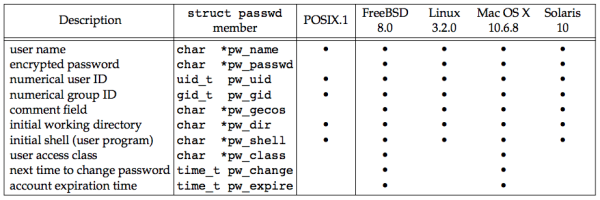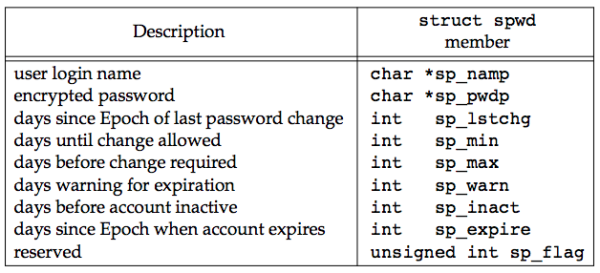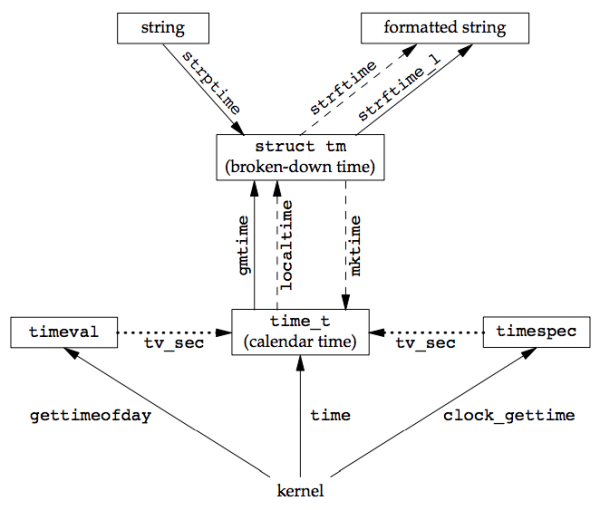Chapter 6. System Data Files and Information¶
This chapter covers portable interfaces to data files, system identification functions and the time and date functions.
Password File¶
The UNIX System's password file, called the user database by POSIX.1, contains the following fields:
Historically, the password file has been stored in /etc/passwd and has been an ASCII file.
roothas a user ID of 0 (superuser)- The encrypted password field contains a single character as a placeholder (
x) - Some fields can be empty
- The shell field contains the user's login shell. The default value for an empty shell field is usually
/bin/sh. Other executable that prevents a user from loggin in to a system:/dev/null/bin/false: exits with an unsuccessful (nonzero) status/bin/true: exits with a successful (zero) statusnologin: prints a customizable error message and exits with a nonzero exit status
nobodyuser name can be used to allow people to log in to a system, but with a user ID (65534) and group ID (65534) that provide no privileges.- Some systems that provide the
finger(1)command support additional information in the comment field
Some systems provide the vipw command to allow administrators to edit the password file.
#include <pwd.h> struct passwd *getpwuid(uid_t uid); struct passwd *getpwnam(const char *name); /* Both return: pointer if OK, NULL on error */
getpwuid: used by thels(1)program to map the numerical user ID contained in an i-node into a user's login name.getpwnam: used by thelogin(1)program when we enter our login name
Both functions return a pointer to a passwd structure that the functions fill in. This structure is usually a static variable within the function, so its contents are overwritten each time we call either of these functions.
#include <pwd.h> struct passwd *getpwent(void); /* Returns: pointer if OK, NULL on error or end of file */ void setpwent(void); void endpwent(void);
getpwent: returns the next entry (a pointer to a structure that it has filled in, this structure is overwritten each time we call this function) in the password file.setpwent: rewinds filesendpwent: closes files
Example:
setpwent at the beginning of this function is self-defense: we ensure that the files are rewound, in case the caller has already opened them by calling getpwent.
Shadow Passwords¶
Systems store the encrypted password in another file, often called the shadow password file. Minimally, this file has to contain the user name and the encrypted password.
The shadow password file should not be readable by the world. Only a few programs need to access encrypted passwords, e.g. login(1) and passwd(1), and these programs are often set-user-ID root. With shadow passwords, the regular password file, /etc/passwd, can be left readable by the world.
#include <shadow.h> struct spwd *getspnam(const char *name); struct spwd *getspent(void); /* Both return: pointer if OK, NULL on error */ void setspent(void); void endspent(void);
Group File¶
The UNIX System’s group file, called the group database by POSIX.1, contains the following fields:
The field gr_mem is an array of pointers to the user names that belong to this group. This array is terminated by a null pointer.
#include <grp.h> struct group *getgrgid(gid_t gid); struct group *getgrnam(const char *name); /* Both return: pointer if OK, NULL on error */
Like the password file functions, both of these functions normally return pointers to a static variable, which is overwritten on each call.
#include <grp.h> struct group *getgrent(void); /* Returns: pointer if OK, NULL on error or end of file */ void setgrent(void); void endgrent(void);
getgrent: reads the next entry from the group file, opening the file first, if it’s not already open
Supplementary Group IDs¶
newgrp(1) can be used to change the real group ID to the new group’s ID. We could always go back to our original group (as listed in /etc/passwd) by executing newgrp without any arguments.
With 4.2BSD, the concept of supplementary group IDs was introduced. The file access permission checks were modified so that in addition to comparing the the file’s group ID to the process effective group ID, it was also compared to all the supplementary group IDs.
The constant NGROUPS_MAX specifies the number of supplementary group IDs.
#include <unistd.h> int getgroups(int gidsetsize, gid_t grouplist[]); /* Returns: number of supplementary group IDs if OK, −1 on error */ #include <grp.h> /* on Linux */ #include <unistd.h> /* on FreeBSD, Mac OS X, and Solaris */ int setgroups(int ngroups, const gid_t grouplist[]); #include <grp.h> /* on Linux and Solaris */ #include <unistd.h> /* on FreeBSD and Mac OS X */ int initgroups(const char *username, gid_t basegid); /* Both return: 0 if OK, −1 on error */
getgroups- gidsetsize > 0: the function fills in the array up to gidsetsize supplementary group IDs
- gidsetsize = 0: the function returns only the number of supplementary group IDs;
grouplistis not modified
setgroups: called by the superuser to set the supplementary group ID list for the calling processinitgroups: reads the entire group file with the functionsgetgrent,setgrent, andendgrentand determines the group membership for username. It then calls setgroups to initialize the supplementary group ID list for the user. It includes basegid in the supplementary group ID list; basegid is the group ID from the password file for username. See Setting the Group IDs
Implementation Differences¶
[p184-185]
Other Data Files¶
Numerous other files are used by UNIX systems in normal day-to-day operation.
Services and networks:
/etc/services/etc/protocols/etc/networks
The general principle is that every data file has at least three functions:
get: reads the next record, opening the fileset: opens the file, if not already open, and rewinds the fileend: closes the data file
| Description | Data file | Header | Structure | Additional keyed lookup functions |
|---|---|---|---|---|
| passwords | /etc/passwd |
<pwd.h> |
passwd |
getpwnam, getpwuid |
| groups | /etc/group |
<grp.h> |
group |
getgrnam, getgrgid |
| shadow | /etc/shadow |
<shadow.h> |
spwd |
getspnam |
| hosts | /etc/hosts |
<netdb.h> |
hostent |
getnameinfo, getaddrinfo |
| networks | /etc/networks |
<netdb.h> |
netent |
getnetbyname, getnetbyaddr |
| protocols | /etc/protocols |
<netdb.h> |
protoent |
getprotobyname, getprotobynumber |
| services | /etc/services |
<netdb.h> |
servent |
getservbyname, getservbyport |
Login Accounting¶
Two data files provided with most UNIX systems:
utmp: keeps track of all the users currently logged inwtmp: keeps track of all logins and logouts
struct utmp { char ut_line[8]; /* tty line: "ttyh0", "ttyd0", "ttyp0", ... */ char ut_name[8]; /* login name */ long ut_time; /* seconds since Epoch */ };
On login, the login program fills one of these structures, and writes it to the utmp and wtmp file. On logout, the init process erases this entry (fills with null bytes) in utmp file and appends a new logout entry. This logout entry in the wtmp file had the ut_name field zeroed out. Special entries were appended to the wtmp file to indicate when the system was rebooted and right before and after the system’s time and date was changed.
The who(1) program read the utmp file and printed its contents in a readable form
System Identification¶
#include <sys/utsname.h> int uname(struct utsname *name); /* Returns: non-negative value if OK, −1 on error */
struct utsname { char sysname[]; /* name of the operating system */ char nodename[]; /* name of this node */ char release[]; /* current release of operating system */ char version[]; /* current version of this release */ char machine[]; /* name of hardware type */ };
#include <unistd.h> int gethostname(char *name, int namelen); /* Returns: 0 if OK, −1 on error */
gethostname (now defined as part of POSIX.1) specifies that the maximum host name length is HOST_NAME_MAX.
| Interface | FreeBSD 8.0 | Linux 3.2.0 | Mac OS X 10.6.8 | Solaris 10 |
|---|---|---|---|---|
uname |
256 | 65 | 256 | 257 |
gethostname |
256 | 64 | 256 | 256 |
If the host is connected to a TCP/IP network, the host name is normally the fully qualified domain name of the host.
There is also a hostname(1) command that can fetch or set the host name. (The host name is set by the superuser using a similar function, sethostname.) The host name is normally set at bootstrap time from one of the start-up files invoked by /etc/rc or init.
Time and Date Routines¶
Calendar times: number of seconds (represented in a time_t data type) that have passed since the Epoch: 00:00:00 January 1, 1970, Coordinated Universal Time (UTC). These calendar times represent both the time and the date. The UNIX System has always differed from other operating systems in:
- keeping time in UTC instead of the local time
- automatically handling conversions, such as daylight saving time
- keeping the time and date as a single quantity
The time function returns the current time and date.
#include <time.h> time_t time(time_t *calptr); /* Returns: value of time if OK, −1 on error */
The time value is always returned as the value of the function. If the argument is non-null, the time value is also stored at the location pointed to by calptr.
Clock type identifiers¶
The real-time extensions to POSIX.1 added support for multiple system clocks. A clock is identified by the clockid_t type.
| Identifier | Option | Description |
|---|---|---|
CLOCK_REALTIME |
real system time | |
CLOCK_MONOTONIC |
_POSIX_MONOTONIC_CLOCK |
real system time with no negative jumps |
CLOCK_PROCESS_CPUTIME_ID |
_POSIX_CPUTIME |
CPU time for calling process |
CLOCK_THREAD_CPUTIME_ID |
_POSIX_THREAD_CPUTIME |
CPU time for calling thread |
#include <sys/time.h> int clock_gettime(clockid_t clock_id, struct timespec *tsp); /* Returns: 0 if OK, −1 on error */ int clock_getres(clockid_t clock_id, struct timespec *tsp); /* Returns: 0 if OK, −1 on error */ int clock_settime(clockid_t clock_id, const struct timespec *tsp); /* Returns: 0 if OK, −1 on error */ int gettimeofday(struct timeval *restrict tp, void *restrict tzp); /* Returns: 0 always */
clock_gettime: gets the time of the specified clock. The time is returned in atimespecstructureclock_getres: determines the resolution of a given system clock. It initializes thetimespecstructure pointed to by the tspclock_settime: sets the time for a particular clock.gettimeofday: now obsolescent. The only legal value for tzp isNULL.
Once we have the integer value that counts the number of seconds since the Epoch, we normally call a function to convert it to a broken-down time structure, and then call another function to generate a human-readable time and date.
The two functions localtime and gmtime convert a calendar time into a broken-down time, a tm structure.
struct tm { /* a broken-down time */ int tm_sec; /* seconds after the minute: [0 - 60] */ int tm_min; /* minutes after the hour: [0 - 59] */ int tm_hour; /* hours after midnight: [0 - 23] */ int tm_mday; /* day of the month: [1 - 31] */ int tm_mon; /* months since January: [0 - 11] */ int tm_year; /* years since 1900 */ int tm_wday; /* days since Sunday: [0 - 6] */ int tm_yday; /* days since January 1: [0 - 365] */ int tm_isdst; /* daylight saving time flag: <0, 0, >0 */ };
The reason that the seconds can be greater than 59 is to allow for a leap second.
#include <time.h> struct tm *gmtime(const time_t *calptr); struct tm *localtime(const time_t *calptr); /* Both return: pointer to broken-down time, NULL on error */
gmtime: converts the calendar time to UTC time (broken time)localtime: converts the calendar time to local time (broken time)mktime: takes a broken-down time, expressed as a local time, and converts it into atime_tvalue- The
strftimeandstrftime_lfunctions are the same, except that thestrftime_lfunction allows the caller to specify the locale as an argument. The strftime function uses the locale specified by theTZenvironment variable- tmptr argument is the time value to format, specified by a pointer to a broken-down time value. [p192]
- format argument controls the formatting of the time value
Conversion specifiers for strftime¶
| Format | Description | Example |
|---|---|---|
%a |
abbreviated weekday name | Thu |
%A |
full weekday name | Thursday |
%b |
abbreviated month name | Jan |
%B |
full month name | January |
%c |
date and time | Thu Jan 19 21:24:52 2012 |
%C |
year/100: [00–99] | 20 |
%d |
day of the month: [01–31] | 19 |
%D |
date [MM/DD/YY] | 01/19/12 |
%e |
day of month (single digit preceded by space) [1–31] | 19 |
%F |
ISO 8601 date format [YYYY–MM–DD] | 2012-01-19 |
%g |
last two digits of ISO 8601 week-based year [00–99] | 12 |
%G |
ISO 8601 week-based year | 2012 |
%h |
same as %b |
Jan |
%H |
hour of the day (24-hour format): [00–23] | 21 |
%I |
hour of the day (12-hour format): [01–12] | 09 |
%j |
day of the year: [001–366] | 019 |
%m |
month: [01–12] | 01 |
%M |
minute: [00–59] | 24 |
%n |
newline character | |
%p |
AM/PM | PM |
%r |
locale’s time (12-hour format) | 09:24:52 PM |
%R |
same as %H:%M |
21:24 |
%S |
second: [00–60] | 52 |
%t |
horizontal tab character | |
%T |
same as %H:%M:%S |
21:24:52 |
%u |
ISO 8601 weekday [Monday = 1, 1–7] | 4 |
%U |
Sunday week number: [00–53] | 03 |
%V |
ISO 8601 week number: [01–53] | 03 |
%w |
weekday: [0 = Sunday, 0–6] | 4 |
%W |
Monday week number: [00–53] | 03 |
%x |
locale’s date 01/19/ | 12 |
%X |
locale’s time 21:24: | 52 |
%y |
last two digits of year: [00–99] | 12 |
%Y |
year | 2012 |
%z |
offset from UTC in ISO 8601 format | -0500 |
%Z |
time zone name | EST |
%% |
translates to a percent sign | % |
strftimeexample: strftime.c
Conversion specifiers for strptime¶
| Format | Description |
|---|---|
%a |
abbreviated or full weekday name |
%A |
same as %a |
%b |
abbreviated or full month name |
%B |
same as %b |
%c |
date and time |
%C |
all but the last two digits of the year |
%d |
day of the month: [01–31] |
%D |
date [MM/DD/YY] |
%e |
same as %d |
%h |
same as %b |
%H |
hour of the day (24-hour format): [00–23] |
%I |
hour of the day (12-hour format): [01–12] |
%j |
day of the year: [001–366] |
%m |
month: [01–12] |
%M |
minute: [00–59] |
%n |
any white space |
%p |
AM/PM |
%r |
locale’s time (12-hour format, AM/PM notation) |
%R |
time as %H:%M |
%S |
second: [00–60] |
%t |
any white space |
%T |
time as %H:%M:%S |
%U |
Sunday week number: [00–53] |
%w |
weekday: [0 = Sunday, 0–6] |
%W |
Monday week number: [00–53] |
%x |
locale’s date |
%X |
locale’s time |
%y |
last two digits of year: [00–99] |
%Y |
year |
%% |
translates to a percent sign |
Functions that are affected by TZ environment variable. If defined, the value of this environment variable is used by these functions instead of the default time zone:
localtimemktimestrftime



